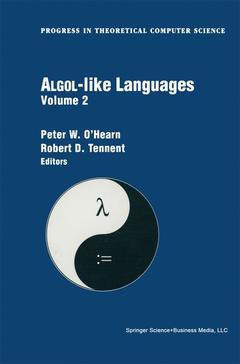Description
Algol-like Languages, 1997
Progress in Theoretical Computer Science Series
Authors: O'Hearn Peter, Tennent Robert
Language: English
Subject for Algol-like Languages:
Keywords
ALGOL; Computer; Languages; ML; Turing; Variable; calculus; code; compiler; compiler construction; lambda calculus; logic; programming language; semantics
Approximative price 105.49 €
Subject to availability at the publisher.
Add to cart
Algol-like Languages
Publication date: 12-1996
349 p. · 15.6x23.4 cm · Hardback
Publication date: 12-1996
349 p. · 15.6x23.4 cm · Hardback
Approximative price 105.49 €
In Print (Delivery period: 15 days).
Add to cart
Algol-like Languages
Publication date: 03-2013
349 p. · 15.5x23.5 cm · Paperback
Publication date: 03-2013
349 p. · 15.5x23.5 cm · Paperback
Description
/li>Contents
/li>
To construct a compiler for a modern higher-level programming languagel one needs to structure the translation to a machine-like intermediate language in a way that reflects the semantics of the language. little is said about such struc turing in compiler texts that are intended to cover a wide variety of program ming languages. More is said in the Iiterature on semantics-directed compiler construction [1] but here too the viewpoint is very general (though limited to 1 languages with a finite number of syntactic types). On the other handl there is a considerable body of work using the continuation-passing transformation to structure compilers for the specific case of call-by-value languages such as SCHEME and ML [21 3]. ln this paperl we will describe a method of structuring the translation of ALGOL-like languages that is based on the functor-category semantics devel oped by Reynolds [4] and Oles [51 6]. An alternative approach using category theory to structure compilers is the early work of F. L. Morris [7]1 which anticipates our treatment of boolean expressionsl but does not deal with procedures. 2 Types and Syntax An ALGOL-like language is a typed lambda calculus with an unusual repertoire of primitive types. Throughout most of this paper we assume that the primi tive types are comm(and) int(eger)exp(ression) int(eger)acc(eptor) int(eger)var(iable) I and that the set 8 of types is the least set containing these primitive types and closed under the binary operation -.
11 Functor Categories and Store Shapes.- 12 Using Functor Categories to Generate Intermediate Code.- 13 Semantical Analysis of Specification Logic.- 14 Semantical Analysis of Specification Logic, 2.- 15 Full Abstraction for the Second-Order Subset.- 16 Parametricity and Local Variables.- 17 Operationally-Based Reasoning About Local Variables.- 18 Syntactic Control of Interference Revisited.- 19 Global State Considered Unnecessary.- 20 Linearity, Sharing and State.- 21 The Essence of Parallel Algol.- of Volume 1.
© 2024 LAVOISIER S.A.S.




